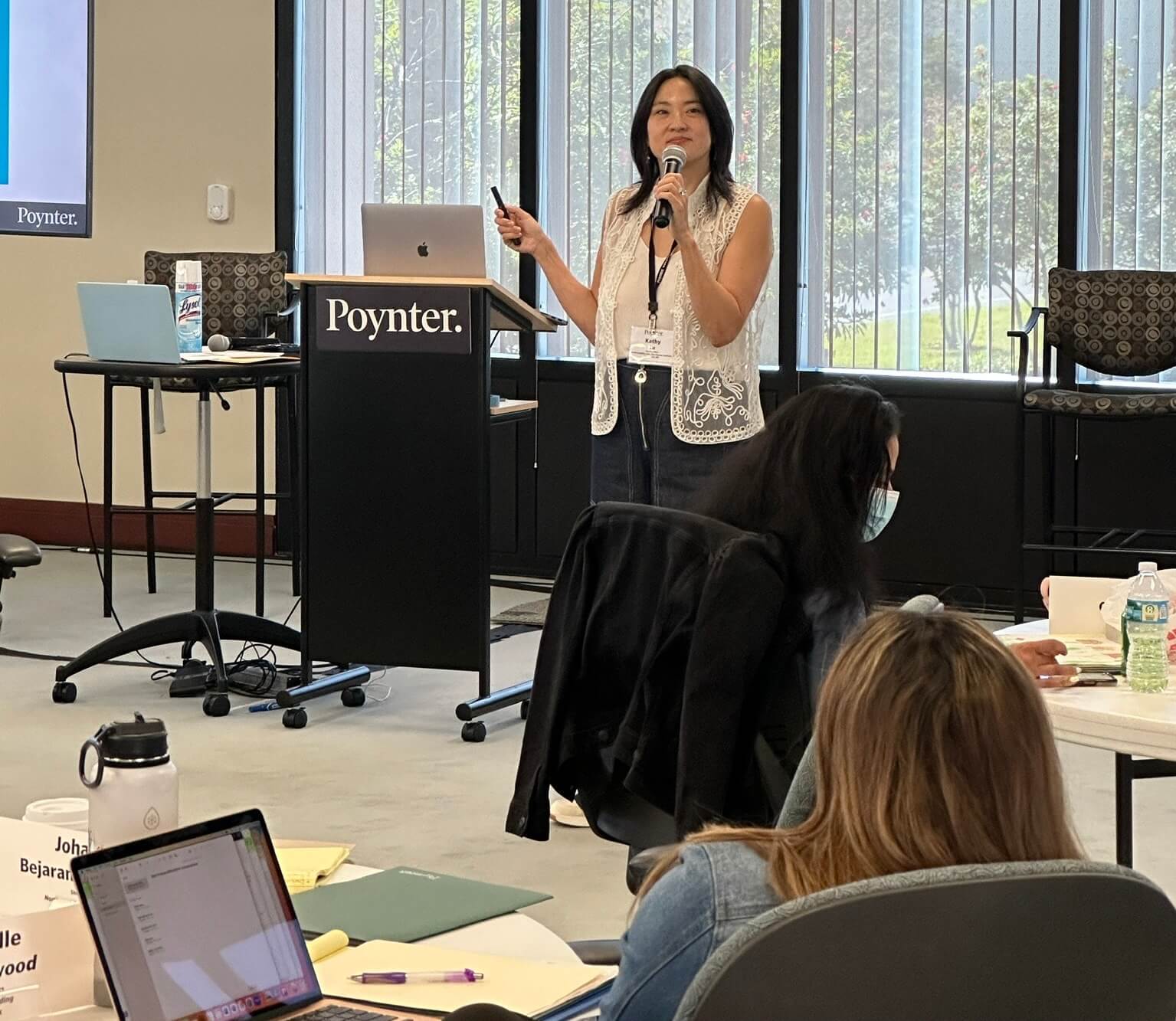I mainly interview journalists who are launching really innovative products in smaller newsrooms, but this week I decided to change things up a bit and talk to a software developer. His name is Dave Winer and he’s probably most well-known for this contributions to blogging, podcasting and content management platforms.
Dave is one of those people who makes everything he does open and accessible. He publishes everything he’s contemplating to multiple sites on the Internet, through a cross-platform linkblogging tool that he designed called Radio3. He has built RSS aggregators and an open source version of Medium.
Basically Dave works on software — but thinks a lot about journalism and tinkers a lot on journalism-related projects.
I reached out to Dave after we talked on Twitter and he tweeted that he thought journalism students should learn how to set up Web servers and blogging systems.
That seemed like a provocative statement and more akin to something that software engineering students should learn. But Dave said, “Nope, journalism students need to learn this, too.”
So I asked Dave if he could elaborate and explain why. He said sure, and we talked about technology, journalism and tools that might be useful for different newsrooms.
MK: You’ve said on Twitter that “it would make such a huge difference over time if journalists weren’t so controlled by tech.” Could you explain what you mean by that?
DW: You know the old saying that freedom of the press is guaranteed only to those who own one? I know it’s cute, but it’s also true. Journalism depends on tech to provide a level playing field, but when has tech ever promised to provide one? That’s been implicit in the complaints about Facebook’s algorithm. Facebook decides what people need to see, and they’re not even willing to tell anyone how they decide — and that’s their right, just as news organizations don’t tell us how they decide what gets coverage and what doesn’t.
So as tech advances into news, they will do more deciding about who-sees-what, and they’ll do it with one thing in mind — maximizing the growth and profit of their businesses, not in the interests of news orgs, or any higher principles. So it’s very simple. If you want to be in the news business, you also have to be in the distribution business. And these days that’s called “tech.”
MK: You’ve also talked about journalists running their own servers and their own CMS. I’m sure a lot of people aren’t quite sure how to do this, let alone the benefits. Could you detail how journalism could change if journalists could spin up their own servers?
DW: The main reason is to remove the mystique and to encourage creative thinking. I wouldn’t recommend it if it weren’t a lot easier than most people think it is. And I want to make it even easier, and we can only do that with brave users who step up and give it a try, and help us see where they get in trouble, so we can iterate toward making it easier. Developing software is very much an interactive process. And when we learn, we can make stuff better. Repeat as necessary.
It encourages creative thinking because once you know what’s possible, you’ll get new ideas you wouldn’t otherwise get. How many times, when you come back from a trip to a foreign country, do you have fantastic ideas for new things you could do? Stepping outside your comfort zone in tech is like that, too.
There are methods to creativity, and this is an important one. Go on intellectual adventures. You come back with new eyes.
And with all the talk about learning to “code” — learning to run a server is a lot easier, and has immediate benefits. And it’s a gateway drug for coding. Once you have a server running, you’ll find tasks that you want to automate by writing little bits of code. It’ll ground your development as a programmer in real-world problems right from the start. I’ve been doing this for a long time, and I’m always learning, because first I create the problem, then I solve it. So running a server is a great first step toward becoming more technically powerful.
MK: How would what journalists create on their own servers be discovered? Part of what I’m seeing doing in the Mediums and Reddits of the world is act as the discovery vehicle.
DW: You hear this a lot about Medium, and I’m not convinced it’s anything but good marketing on their part.
Regardless, people discover news writing on Twitter and Facebook much more than they do on Medium. I’d focus on developing systems that do what they do first, and what they do is not hard! Loop back to the first question. This is why we must have independent distribution systems. Maybe something like Hulu was for TV, for news.
When you trust Medium to do the distribution for you, your stuff will go where Medium wants it to go, not where you want it to go.
MK: If you could start a journalism publication or product from scratch, what would it look like?
DW: Have a look at Podcatch or Techblast, two sites that I run that provide good podcast listening and comprehensive tech news. That’s what news systems will look like in the future. Every news org should start with a “river” like those sites. An aggregation of news sources you consider authoritative. Then go from there.
When you see an interesting story develop, start a topic page and link developing news into those pages. I think in this sense Circa was onto something. Each story creates its own news site. How that’s formatted, and how people use that, we have to iterate over the design, to find patterns that work.
MK: You work on a lot of projects that help people aggregate information or surface information. What tools have you developed that journalists could use in their own work?
DW: There are so many! 🙂
Radio3 is great for posting links to Twitter, Facebook and an RSS feed. This exemplifies my philosophy of news today. Twitter and Facebook exist now, and people want to get the news there. So we must provide it. But we must also create our own independent Web presence so new non-controlled distributions systems can come about. That’s why it’s also important to flow your linkblog to RSS.
Happy Friends is a mailbox-style reader for Twitter. I use it to keep up with certain important people whose tweets I don’t want to miss, like you Melody! 🙂 It’s such a simple idea, and incredibly useful.
Fargo is a publishing system based on outlines. Each blog is an outline, with stories hanging off branches of the structure. It has a full object-oriented CMS. If you used my blogging systems, Radio, Manila or Frontier, you’ll immediately understand Fargo. I love working with outliners, and I’m going to have more Web-writing tools that work with outlines in the future.
PagePark is a simple Node-based Web server. If you want to learn how to set up and run a server, it doesn’t get any easier than PagePark. But it is GitHub project so it’s not exactly an end-user product.
River4 is a river-of-news aggregator. Like PagePark, it’s a server app, and requires server-running skills. But it’s amazing how powerful it is to have your own river, with your news sources accumulating stories for you to share with your team and followers.
All these products are free to use. PagePark and River4 are open source, MIT License.
MK: Why is it important to publish simultaneously to multiple platforms?
DW: Today I publish to Twitter, Facebook and the open Web.
Why? People are on Twitter and Facebook and want links. It’s that simple.
I post to the open Web because that allows me to build flows with other people who participate in the open Web. I don’t have that kind of access to the flows of Twitter and Facebook. They pretty much have a monopoly on innovation on their platforms.
That’s the way it works. If I want to continue to be active as a developer, I have to feed the web, and I depend on other people to do the same. If this ever stops, everyone who doesn’t work for Twitter and Facebook will be fairly impotent, imho.
As Benjamin Franklin said, on the signing of the Declaration of Independence, “We must, indeed, all hang together, or assuredly we shall all hang separately.” He would have understood the open Web, that’s for sure.
MK: I’ve written in the past about my fears about archiving and private social media networks. What are your thoughts on this?
DW: OMG. We are totally blowing it.
Here’s how bad the situation is. A few days or weeks after I die, and unfortunately that day will come, all of what I’ve published to the Web will disappear. Why? Unless someone pays my hosting fees, Amazon, Rackspace and a few other vendors will close my accounts. Maybe they’ll even delete all the files. Any dynamic content I have will certainly disappear.
And, as far as I know, there’s nothing I can do now to prepare for this.
And I am a developer. It’s my business to understand how the technology works. And I’m telling you it doesn’t.
A couple of disclaimers:
1. I know about archive.org. It maintains a backup copy of much of the content on the Web. It’s great. But it’s not the same thing as a Web presence.
2. The Library of Congress has been archiving all tweets, so we know a permanent record is being created there. Yet we still have no way to create a long-living link to a tweet. If Twitter goes away someday, a large piece of the Web will disappear.
It’s no longer just a theory that platforms like Medium or Twitter or even Facebook do go away. I wouldn’t trust the longevity of anything you post on those sites.
I’ve been writing about what I call future-safe archives for quite some time. There are solutions, and we should be working on them. An important part of what news does is maintain an archive past news.
MK: You spent the past weekend working on an open source version of Medium. What are the benefits and costs of publishing on this platform vs. Medium?
DW: I’ve spent a lot more time on this than one weekend, and the service doesn’t exist yet. We do not yet have an open source Medium alternative. We’re close. The software itself is fairly trivial. We just need to have the will to do it, and so far, it has not come together. However, I’m optimistic that it will.
Why do this? Because Medium is a silo. Smart people who, in my humble opinion, should know better are posting good writing there, stuff that should be available 10, 20 or 100 years from now, with no promise that any of it will exist for any period of time.
I’ve seen open source projects post official docs on Medium. This is not good, or even acceptable. Incorporating a closed platform into open source projects, when one could be building on open platforms — that’s not okay.
But there is no good open alternative to Medium. There are bits and pieces. I’m trying to get them to come together in a product that people will find as easy to use and beautiful as Medium, and open. They are entitled to the best, without any sacrifice of access or longevity of the content.
MK: Who’s doing it right in journalism? Why?
DW: There are certainly news orgs that are doing inspiring, courageous work, exploring new ideas that seem to have potential. But no one has put it all together yet in a way that makes me feel that they have got the full vision of where news is going.
To do it right, they’d have to build around the people who we used to think of as sources. In the past, a reporter would call a few of them to make a story, but today, when they want to comment, the sources just get on Twitter and say what they think. So the reporting process is flipped around. Journalism has adjusted, but how good can journalism be when the system is as limited as Twitter is? Maybe that’s why today’s news is so coarse. How much subtlety can you communicate in 140 characters? Twitter is basically a medium of grunts and snorts. And Facebook, without the 140 characters limit, has got its own oddities.
These are inadequate systems, so it’s hard to put together a real news system in 2015. The foundations just aren’t there. But creating the foundations, that’s something the news industry should be excited about! The ways that tech is weak are exactly the strong points of journalism.
With those caveats, I love Quartz. I love everything about what they say about what they do, and how they put their ideas into practice. They’re young and they’re willing to risk, and they like to think and play. I find all that very refreshing.
Others worth mentioning: Gawker has put together the best public news system around. But they hire aggressive reporters, and that’s fine I guess, but it makes it impossible to build any trust with them. They just go crazy at random times. (This is true of a lot of news orgs, btw, not just Gawker.)
And believe it or not, I like BuzzFeed. I think they’re making a huge bet in tech news, and there’s a vacuum. Tech news is ripe for disruption.
MK: If a journalist wanted to learn more about creating servers or spinning up their own products, where would you suggest they start? I’m thinking of smaller newsrooms, resource-strapped newsrooms, and newsrooms with very small staffs. If they can’t spin up a server, what’s a good first step to take?
That’s a very good question!
And there is no answer as far as I know.
We need to work on this, Melody.
Let’s create a flow of information for these exact organizations. The ones who are inquisitive, ready to put it all out there, who feel inspired by the opportunities in front of them, but don’t know how to get started. Let’s treat that exact problem as a product definition, and let’s work together to solve it. I’m ready. Let’s do it.







